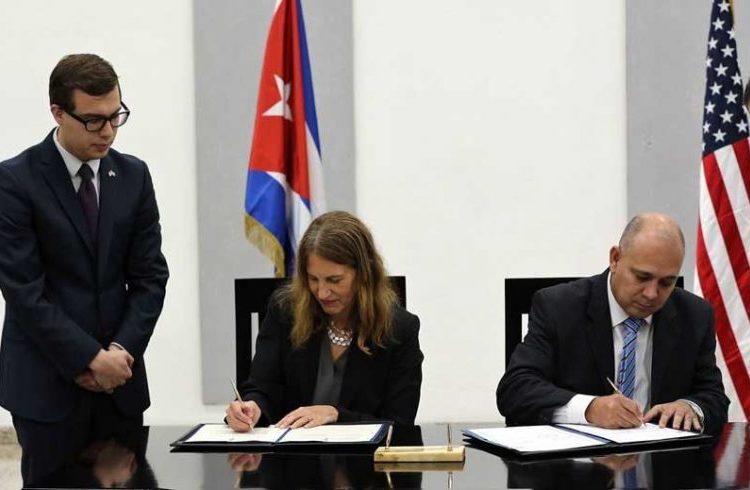U.S. Secretary of Health and Human Services Sylvia M. Burwell affirmed in a meeting with the press in Havana that she is “optimistic about the steps being taken.”
The secretary carried out her first official visit to Cuba to hold talks with the Ministry of Public Health – her counterpart in the country – about bilateral collaboration in the sphere of health.
Last October 20 the parties signed a memorandum of understanding in the area of cancer, about which Cuban Minister of Health Roberto Morales said that it turns into a reality an intention appearing in the framework memorandum signed in Washington last June, “which ratifies the will to advance in collaboration between both countries in the sphere of health,” the daily Granma reported.
“We are committed,” said Burwell for her part. She considers that collaboration in health between the two countries is still in “an initial period…. We are in a period of diagnosing; we need a bit more time and specification.”
However, she also estimates that “the movements have been fast if we take into account that it was in June when we made our first memorandum of understanding and I’m here now.”
In June, Secretary Burwell signed a memorandum of understanding with her Cuban counterpart, Dr. Roberto Morales Ojeda. The document ratifies the shared interest in confronting infectious diseases like zika, dengue and chikungunya, and non-transmissible chronic diseases like cancer, diabetes, hypertension and its risk factors.
The memorandum also established coordination in a wide range of matters like global medical security, search and research, as well as in information technology. “This new collaboration is a historic opportunity for the two nations to build on each other’s knowledge and experience, and benefit biomedical research and public health in general,” Sylvia Burwell said at the time.
In Cuba cancer is the disease that causes the most deaths, in the United States it’s the second most deadly. “We have very similar problems. We have very similar interests and priorities in which we are all interested in advancing at another level,” concluded in Havana the secretary, who previously held the post of Director of the Office of Management and Budget (OMB).
Zika, chikungunya, dengue and yellow fever are other viral diseases whose research and treatment concerns the two countries. “We all want a vaccine against zika,” Burwell said.
Like in other areas, in this one the blockade represents an obstacle. “It’s an issue that comes up [in the talks]. I think Cubans know that it is something on which this administration has had a very clear position, that we seek and think the embargo must be lifted,” the official commented.
In President Obama’s most recent package of measures, the amendments to the Treasury Department include facilitating transactions related to health:
Joint medical research. OFAC granted a new authorization that will allow persons subject to U.S. jurisdiction to participate in joint medical research projects with Cuban citizens. This authorization includes both commercial and non-commercial research.
Pharmaceutical products of Cuban origin. OFAC granted a new authorization that will allow influential transactions to get the approval by the U.S. Food and Drug Administration (FDA) of pharmaceutical products of Cuban origin. An additional authorization will allow the import to the United States, and the marketing, sale or other type of distribution in the United States of pharmaceutical products of Cuban origin approved by the FDA.
Bank accounts. Persons subject to U.S. jurisdiction who participate in the aforementioned health-related activities will also be authorized to open and keep bank accounts in Cuba for their use in carrying out the authorized commercial activity.
A propos the political obstacle the Cuban Medical Professional Parole (CMPP) program represents, Burwell mentioned that it was not a topic on the table “but we know of it. The embassy in Cuba and the administration are aware of this concern, our focus in the talks was on where we can work together,” she insisted.
The CMPP was created by the Department of State in 2006 and is directed at Cuban medical professionals who abandon an international mission. One of Cuba’s demands in the agenda for normalization is that it be eliminated.
“The goal is to find in these initial steps problems and places for common ground where we think we can work together to advance and recognize other problems,” she said in general terms.
Sylvia Burwell’s visit, one week after the Obama administration’s announcement of the new measures for the island, consolidates the rapprochement between Cuba and the United States in such a sensitive area as health. This visit forms part of the high-level exchanges taking place in October and November, in which topics such as human rights have already been dealt with.
As part of her visit to Cuba, the U.S. secretary of health and human services participated in the Regional Meeting on the confrontation of zika and other arboviruses held in the Hotel Nacional. The meeting’s aim was to coordinate a regional coordination strategy focused on the prevention and control of these diseases, as well as seeking joint formulas for progress in health services, increasing the diagnostic capacity and improving the chemical management.
TN: Sylvia Burwell quotes translated from the Spanish.










